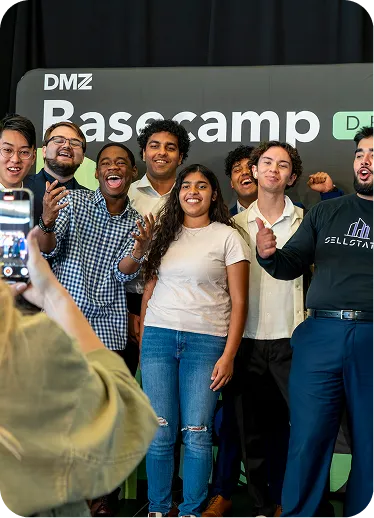Women founders are a key part of a thriving entrepreneurial ecosystem, yet they continue to make up a minority and face unique challenges. Recognizing this, the DMZ has launched a new Women Founders Series that brings together female founders from across different startup communities for roundtable discussions and candid conversations. The series kicked off on December 4, 2019 with keynote speaker Natalie Gray, Cofounder of Cover. Here's a recap of what happened.
Natalie Gray's Journey to Become a Two-Time Founder
Natalie Gray was born and raised in Mississauga, Ontario. After completing an undergrad in commerce at Queen's University, Natalie was drawn to New York City to attend business school at New York University. While there, she landed herself a coveted job at Rush Communications doing brand partnerships and marketing.
During her time at Rush, she realized she stood out among her peers when it came to working with numbers. Wanting to deepen her differentiating skills, Natalie returned to Canada at age 22 and completed a three-year math degree in just one short year at Queen's University.
Although the experience was intense, Natalie says it proved to herself that she's capable of working exceptionally hard, managing her time methodically and achieving success under pressure. She thinks what helped her most was her passion and drive to create a dream career for herself - a mindset that had rubbed off on her while in New York City.
After graduating, she - like other millennials at the time - entered into a job market that was suffering in the wake of a recession. However, she came across an opportunity to join three other people in co-founding a startup called StyleKick. After two and a half years of hard work, challenges, setbacks and successes, the app was absorbed by Shopify in an acqui-hire. Natalie and her co-founders joined the Shopify team for a brief time on the product and design teams; however, they were itching to get back to the startup scene.
One weekend, while away at a cottage with her original co-founder crew, the foursome came up with a new idea - an app that would enable users to upload photos of their possessions (like their car, home or pets) and get quotes from several l insurance providers at once. They built a rudimentary version of the app in just 48 hours and their next venture, Cover, was born.
In 2016, Cover was accepted into Y Combinator and, over the next several years, Natalie helped the startup successfully close several large rounds of funding. The company has grown to over 130 people with offices located in Toronto, San Francisco, and Los Angeles.
Key Issues Facing Women Founders Today - and Strategies for Approaching Them
Natalie's keynote address, along with the "ask me anything" session that followed, produced an engaging, honest and candid dialogue. Many of the 25 founders around the table shared both their successes and challenges and asked Natalie for practical advice on critical issues facing their startups today.
From the conversations, three salient themes emerged:
1. Women Founders Continue to Face Discrimination
Natalie and many of the women around the table shared honest accounts of their experiences with discrimination in the tech startup space - and in particular when trying to raise funding. Although each person's experience was unique, there were noticeable commonalities between them. And, in many instances, these personal stories highlighted the intersectional nature of discrimination based on gender identity, race, nationality, parental status and so on.Natalie shared several tips that she's found particularly effective when approaching difficult situations, including asserting herself and speaking with a confident and controlled tone, bringing the conversation back to the business itself if it strays, not honouring questions that have discriminatory underpinnings, and seeking out investors that respect women and see the value of diversity in business. She also shared strategies that can help ensure women are represented on boards, leadership teams and across different areas of the organization. Finally, she made the point that if an investor wants to pass up on a lucrative business opportunity because of their bias, it's their loss and someone else's gain.
2. Fostering Diversity within Startups is Necessary, Though Not Always Easy
Diversity is critical when it comes to business success. Diverse viewpoints, opinions and backgrounds strengthen a business and make it more resilient - this is something we know. Yet, it's not always easy to achieve diversity, especially in the tech industry where certain groups are underrepresented. Moreover, some founders found it can be overwhelming dealing with day-to-day issues, let alone finding the time to put a thoughtful diversity strategy in place. To help, Natalie offered a few practical approaches that her company is taking to foster diversity amongst their workforce, including auditing the language used in job postings to reduce bias and promote inclusivity, being mindful that the images they post on social media reflect the makeup of their company, and empowering their team to tackle these issues in new, creative ways.
3. Understanding Funding Options Empowers Founders to Make Better Decisions '
The audience had many questions for Natalie about fundraising, given her unique expertise in this area. Natalie spent time explaining different funding options available to startups at various stages, and some of the key pros and cons of each. She fielded questions from the audience and helped to troubleshoot specific challenges that founders were facing. She also spoke about tactics founders can use to find people who will add value to your business, and how to know when it's the right time to bring in an investor.Natalie reminded the room that, as intense as investor pitches can be, the interview goes both ways--founders must assess if they're a good fit for the business, while investors assess if the business is right for them. Since a startup is likely going to be working closely and over the long-term with their investors, it's important to work with people who truly respect you and value the importance of intersectional diversity. All in all, the first edition of the Women Founder Series offered a unique opportunity for female founders to share their experiences and ask for advice. The conversation was candid, inspiring and packed with actionable tips.
Thank you, Natalie, for kicking off our series with your impactful and highly useful conversation! Want to attend to next event? Be the first to know by following us on social @RyersonDMZ


.webp)




